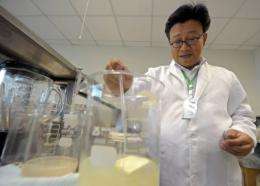Thai tech pioneer converts waste into wealth

Paijit Sangchai drops a small piece of laminated paper into a jar of cloudy liquid which he hopes will transform his start-up into a multi-million dollar company and help revolutionise recycling.
"Now this is the fun part," he says a few minutes later, holding it under the tap to wash away soggy paper pulp and reveal a clear plastic film.
His Thai firm, Flexoresearch, has developed a series of blended enzymes that can recover pulp or fibre from laminated paper such as cigarette packets, stickers or milk cartons that were previously hard or impossible to recycle.
First one enzyme attacks the water resistant chemical coating the surface, then others take over and tackle the paper and adhesive layers.
The resulting pulp, he says, can be used to produce new paper products -- thus saving trees -- or turned into building materials that can be used as an alternative to asbestos, which is potentially hazardous to human health.
The technique, believed to be the first of its kind, also produces clean plastic that can be recycled and used to produce new products.
The firm was recently named one of 31 "Technology Pioneers" by the World Economic Forum, which said its products were "poised to reduce the use of asbestos in the developing world, positively impacting people's health."
Time Magazine described Flexoresearch as one of "10 start-ups that will change your life".
It is a rare honour to be bestowed on an entrepreneur in a country hardly renowned for its technological prowess.
In developing countries such as Thailand, laminated paper is usually thrown away, Paijit says.
"Most people burn it illegally and that causes toxic fumes which harm people's health," he tells AFP at his small laboratory in a science park on the northern outskirts of Bangkok.
"For people in developing countries who suffer from the fumes and don't know why they are sick ... it can help improve their lives," he adds.
And while developed countries like the United States are able to incinerate laminated paper such as fast food wrappers safely, they do not have any commercially viable way to recycle it either, he says.
"Every country uses laminated paper, in stickers and wrappers of food like McDonald's and Kentucky Fried Chicken. That's all laminated and people throw it away," he says. "I think this a global market."
Since winning the Technology Pioneer award -- previous recipients of which include Google and Twitter -- Paijit has been flooded with thousands of emails, mostly from venture capitalists interested in investing in his start-up.
But the affable company founder and CEO is not interested in borrowing more money or selling stakes to investors.
He is looking for people overseas who want to licence the technology, which is already attracting interest in countries including Malaysia, Japan, China, South Korea and India.
"I want to work with people around the world to heal the environment," says Paijit.
It is a far cry from the days he spent experimenting with enzymes produced from mushrooms in a home laboratory after quitting a more than decade-long, well-paid career with a leading Thai industrial giant four years ago.
He invested his savings, then borrowed heavily from the bank, putting up his house as collateral to keep the project going and build a paper mill in eastern Bangkok.
At one point the firm was in debt to the tune of about 1.5 million dollars, but it has since repaid all the money and now employs 17 people.
And Paijit is already eyeing ways to turn other problems into profits, including a technique to turn used liquid coolant drained from refrigeration systems into oil that can be used in the construction industry.
"I make a profit from a problem. I convert waste into wealth," he says.
(c) 2010 AFP



















